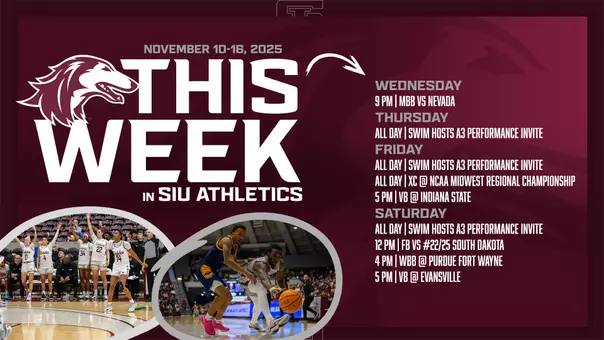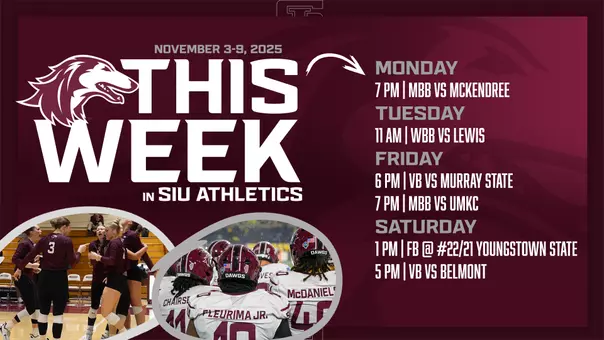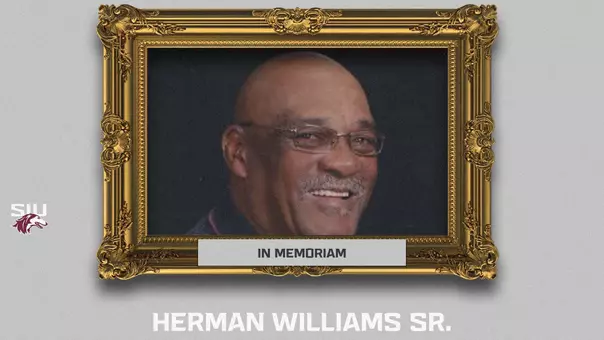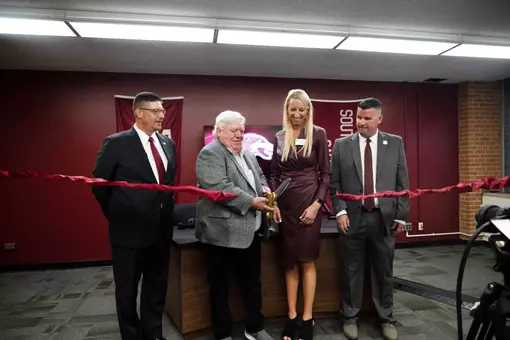Mario Moccia meets with southern Illinois media
12/01/2014 | 12:00:00 | General
Opening Statement "Just like I said in my press conference at New Mexico State last week, it is a very bittersweet feeling because when you are at a place for more than eight years, you have a lot of relationships and friendships. It never seems like work because you have ingrained yourself so much into the fabric of what you are doing, the people you hang out with are your coworkers. All the people that made the Saluki Way stuff possible, all the donors become your friends. That is the most difficult thing that my wife, Heidi, and I have had to deal, which is leaving a bunch of good people.
I want to thank Walter Wendler. He took the chance on a guy that had never been an athletic director. He hired me in the summer of 2006. I met some great people during my interview that became friends to this day. I certainly want to thank Rita Cheng as well. There have been a lot of people to sit in that chair from the Chancellor's standpoint. She was one that really understood the value of intercollegiate athletics and she was a big athletic fan. I would be remiss if I didn't thank her for her being a champion for a lot of stuff that we did.
I am thankful and I feel blessed that I got to work with so many good people. Everything that you have ever seen written from me, Tom (Weber) has been behind that. I just maybe make a couple of changes here and there. Andy Pettit has a degree in engineering and an MBA, and he is picking up the trash at times as our facilities guy. You don't get people to do that. He does it because he loves this place and he has a passion for it. I could go on naming people, but I am just thankful that we have had so many people put their heart and soul into this job. Kerri Blaylock was on the committee that hired me. Just working with great coaches. I always tell people that I got to work with Jerry Kill, who I think is one of the best coaches in the history of college football. I have been very fortunate. I got to hang out with Jim Hart and get to know him. I got to hang out with Walt Frazier and Steve Finley. Pretty unbelievable history. Chet (Savage) came with me from Missouri and has been here the whole time. We brought Mike Reis from the dark side of the media into our fold. He has done a tremendous job.
It's the people that bought in to the vision of Saluki Way. There was not necessarily a culture of giving. People bought tickets and things like that, but people were receptive to the vision that we thought was possible and a lot of people did. I always give Brad Cole a ton of credit when he was the mayor here, for the Saluki Way gift with the sales tax initiative. The students and the people who were in power at the time to make that happen, that was huge. The student fee was a big part of our funding, but to raise $12 million privately for Saluki Way and Itchy Jones Stadium. We didn't do that, we helped a little bit but all we did was create a model and we just asked. It was the people that gave. Whether it was Greg Cook, Roger Tedrick, or Jimmy Karayiannis. Those people were the ones who believed in the vision, gave the money out of their own pockets, and now we have arguably one of the most comprehensive top-to-bottom facilities in our league. Quite frankly, where we sit in the world, other than the BCS schools, we have some nice stuff. I want to thank the donors as well. I want to thank you guys, you have always been fair to us in the media. I hope one of the best things that you say about me is that I always answered a telephone call, text, or email. I appreciate the coverage, good and bad, we always had a good relationship whether we were up or down.
Q: How do you think your career will be defined here at SIU?
"I don't know. That is going to be for you guys and the donors to do that. Certainly, people will talk about the facilities renaissance. That was obviously a big-ticket item. I think that is what they will say first and foremost. Hopefully, they will say that the academics have never been higher. We have hit all-time highs not only in men's basketball, but across the board. That is unbelievably important. I think that we have been involved in the community as much as we have ever been. I was fortunate to inherit this program from a really solid athletic director in Paul Kowalczyk. Paul and I are buddies, we don't talk everyday, but we are very friendly with each other. We had a tremendous run of athletics success. On the flip side, I think a lot of people would have wanted us to keep winning like we did, I wish that too. From an historical standpoint, we went on some pretty unprecedented runs there. I think you would be remembered for the positives, and on the other side you wish you could have been number one in football and wish you would have kept going to NCAA tournaments and Sweet Sixteens in basketball. I think those things probably."
Q: What is the biggest challenge for the next AD?
"When Paul was brought here in 1999, there were some issues that he had to deal with internally. Aside from Jerry Kill's ascension, Bruce Weber, Matt Painter, and Chris Lowery winning, he changed a lot of the internal mechanisms here. When I was brought here, it was a pretty clear mandate; get the external side up and running. It is interesting, Paul is an accountant by nature and I am an external guy by nature. I think through the last 14 years, I think the thing is humming along. The internal side is really good. We have a lot of good things in place externally. We brought Learfield on and we got our facilities. I don't think that the next person needs to be a specialist in one area. I hope that the next person has a good and well-rounded experience. I think he or she will inherit some solid coaches. There are always going to be decisions that need to be made when they get here like facilities and other projects. I don't think they need a specialist. I have my famous to do list that will be sitting on the desk for the next person. If they do that, they should at least keep the thing running down the middle of the fairway."
Q: What recommendations did you give the president for your successor?
"We had a discussion about that. I will keep that close to the vest. We did have a discussion. I will be staying on until right before Christmas break so that I can get everything lined up to the best of my ability. Ultimately, that is the president's call and whoever else he wants to consult with. He asked my opinion and I gave him some thoughts. I do not know what he will do nor did he share that with me. I assume that he is still thinking about it."
Q: Did he give you a timeline of when he wants to hire someone?
"We talked about it, but that question would be better asked to him than me. We talked about it internally. I don't know if he is 100 percent set on what he wants to do. He would be best served to have that question asked to him."
Q: How much of the model that you built here do you want to take to New Mexico State?
"The model really isn't mine. I kind of stole that model from Mike Alden who created that thing at the University of New Mexico in 1992. He had his external and departments set-up the way he liked it. That is how a lot of us AD's grew up on it. That is the model that ultimately I will look to bring to my new position. As for bringing people, that is the hot topic. I brought one person when I got here and that was six months after I got here. I really need to go there and see the lay of the land. I need to see what the budget is like, and if any holes exist in the department. I need to talk to the people out there. I am not going to make change just for change sake. I am old enough to know not to do that. Are there talented people here? No doubt. Are there people here that I would like working for me? No doubt. It is premature to say that I got in mind to bring X, Y, and Z with me."
Q: Are there similar challenges at New Mexico State as there were when you came to SIU?
"Instead of comparing the two schools directly, the upper echelon of the FCS and and the non-power five FBS schools, they are very similar from the budget and personnel standpoint. Their outgoing athletic director is going to work until the end of the month. I have been poking my nose around a little bit and looking at some financial numbers. I have a little bit of a handle of the bigger tasks that we need to attack when I get there. I would say problems are similar all over the place. Things like finances, money, fundraising, and football scheduling. It is relatively similar."
Q: Overall, are you happy with the job you did here?
"I think Mike Reis asked me what grade I would give to myself and those who are under me know that I am a stern grader. I would say above average. An athletic director will always be judged on how the teams are performing. Ironically enough, that is a little out of the athletic director's control. You can say that he could have hired Nick Saban and you could have won all of these national championships. Ultimately, I wish basketball kept its run of going to tournaments and football kept the run of going to the playoffs. I think we have competitive teams. I think that Barry Hinson is building it back. I think that all of the other sport have bright futures. Cindy Stein, I know is going to win. Justin Ingram is doing some historic stuff with the volleyball program. Connie Price-Smith is going to keep producing national champions and conference championships. With the facilities and things like that, I would give myself an above average grade. I will never give myself an A."
Q: What are you most proud of at Southern?
"I am most proud of watching student-athletes come in whose families didn't value education and who didn't have a good home life, and watching them flourish in a home away from home because people here cared. I won't call specific student-athletes out, but there was a men's basketball player, who quite frankly did not value a college education degree in the home. He came here and his grades weren't great. One day he showed Kristina Stepps how to do something on the computer, and she told me that his face lit up. That kid ended up getting a 3.0 and doing unbelievably well in the class because he learned to be confident here. It was something that wasn't really provided to him in his background. I could tell you a million stories of kids who flourished while they are here. That is the most personally rewarding thing versus christening a building or breaking a champagne bottle on the building like it was a ship. Those things are nice and lasting and you can go see your name on a plaque, but in all honesty what the kids give you back will replace any of that stuff. Charlotte West sent me an email and asked if there was anything that she could do. That is impactful to me. That person with that kind of background to say in her own way that you have done a really good job for us at Southern, that means an awful lot to me."




